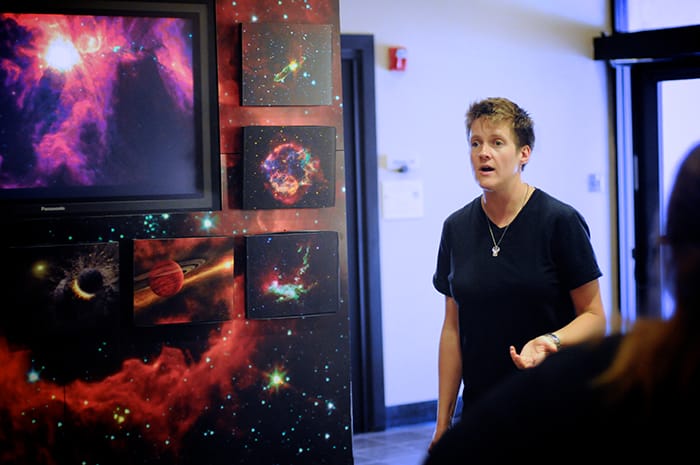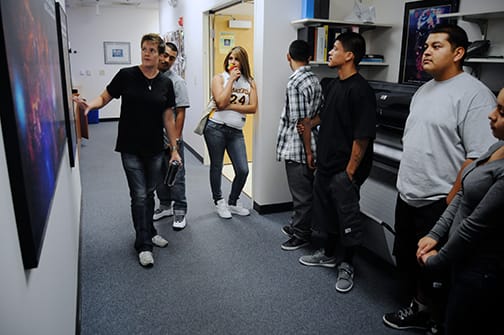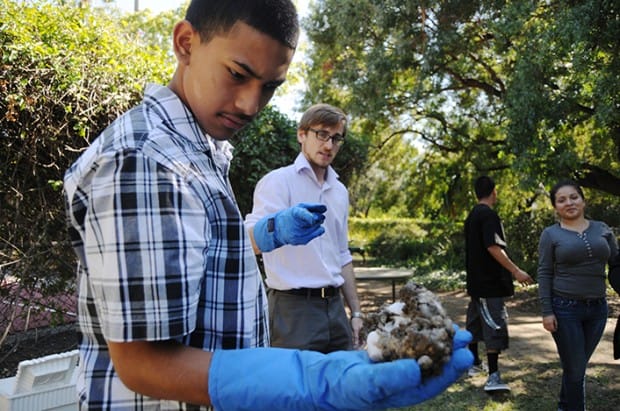Carolyn Brinkworth Takes Science into the Community

With a PhD in astrophysics from the University of Southampton, U.K., Carolyn Brinkworth‘s hard science skills are put to work in managing telescopes for scientists from around the world that come to Caltech to professionally stargaze. But that’s only half of her day job—her real passion lies in outreach.
For Brinkworth, a master’s student in the School of Educational Studies, science and outreach go hand in hand. Her dedication to outreach started early, even during her undergraduate work, she knew she didn’t want to be a researcher.
“The problem I had with research is that it is very narrow thing. Whenever I am doing science research I am working on a very tiny little problem. Which is fine, that’s how research progresses, that’s what science is,” Brinkworth said. “But when you take a step back and you tell people that Voyager just entered interstellar space, that’s something that is really cool. If you were going to drive out to where Voyager is it would take 33,000 years. And now humankind is an interstellar species. I mean, how cool is that?” she said.
The outreach part of her job includes planning talks for the community, helping to create educational videos and tools for the classroom, and working with social media. She takes her outreach one step further; in 2011, she started a partnership with Learning Works, a Southern California school that works with in-crisis students. At Learning Works, Brinkworth manages a volunteer team that coordinates workshops on robotics and astronomy and field trips. She couldn’t imagine a better classroom setting.
“These kids have been involved in gangs, drugs, sometimes we have probation officers in the back of the classroom. It is a really interesting population of kids to work with, mostly because they are really enthusiastic about schooling,” said Brinkworth. “If I have a choice between going into a rich private-school group or this population, who desperately want to be there, I am going to choose these kids every time.”

And her dedication has not gone unrecognized.
Brinkworth was recently awarded the NASA Equal Employment Opportunity Medal for her work with minority students and her volunteer work with The Trevor Project—a nonprofit organization that provides crisis intervention and suicide prevention for LGBTQ youth ages 13-24.
Her work with The Trevor Project, like her role at Learning Works, entails going into the classroom and talking about LGBTQ issues.
“Health classes these days do address issues of sexuality, but they very rarely talk about suicide,” Brinkworth said. “The classes we walk into can be virulently homophobic. We go into classes in Compton, where the kids don’t want to hear it, but probably one or two of the kids in that class are gay. And yet they could never say so. I hope that standing up in front of the class saying the word ‘gay’ in a positive way and challenging homophobia has an effect.”
Between her work at Caltech, volunteering for The Trevor Project, and drumming on the side, Brinkworth still has time to pursue her studies at CGU. Even though she already holds a PhD in astrophysics, Brinkworth places great value on her studies in education. In fact, she finds it vital to her already-successful career.
“It is really important to me to understand what schools are dealing with. So often we ask NASA to produce stuff for the classrooms, but it does not translate to actually using it,” she said. “Part of that is understanding what they are doing day to day in the classroom. Maybe they can’t use the DVDs that we put out because they are working in places where they cant keep rodents out of the classroom, much less have technology.”

Brinkworth’s enthusiasm for education expands beyond the classroom. She notes that her master’s program at CGU has begun to open her eyes about the larger problems in education, particularly in the sciences.
“It’s very apparent that standardized testing is not producing the graduates that we need in science. Minority students are grossly underrepresented in science. We are missing out on this huge pool of talent here. So what are we doing wrong?” she queried.
This is a question she intends to help answer. She hopes that her master’s will assist her in better understanding the dynamics of the classroom and her pursuit to improve the education system.
“To really change the system—and get kids thinking critically and get them thinking creatively about science again—we need to understand where the system is at the moment. That’s why I am back in school. To figure that out.”
For a video about the history and science of the Spitzer Space Telescope where Brinkworth works, click below:
http://www.youtube.com/watch?v=7gfBrr81JGc